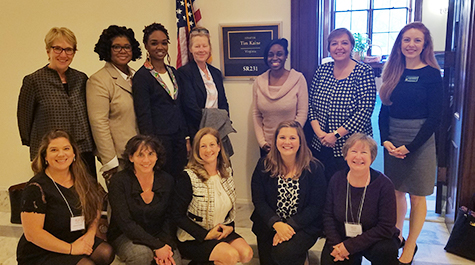A voice on Capitol Hill
Assistant Professor of Special Education Jackie Rodriguez knows her way around Capitol Hill. As an educator researching the needs of diverse learners, including students with disabilities, English language learners and culturally diverse populations, Rodriguez is well-positioned to advocate on behalf of these special groups to policy-makers in Washington, D.C.
“When people think about research, they tend to think of it happening in a distant ivory tower,” says Rodriguez. "The traditional, linear model is one where research informs policy, which in turn dictates practice. Bridging the gaps between these three spheres is absolutely vital if we want to be sure kids are getting the very best education.”
That gap between policy and practice often leaves educators scrambling to interpret and implement legislation with little support. In an effort to bridge the gap, Rodriguez teaches courses that support pre-service teachers, administrators and attorneys in interpreting policy into practice. Current Issues and Trends in Education (CRIN X48) is a requirement for all pre-service special educators and Legislation, Litigation and Special Education (EPPL 735) is offered to education doctoral students and William & Mary Law School students interested in special education law.
In addition to her work in the classroom, Rodriguez travels often to Washington, D.C. to speak with legislators about pressing topics. She was most recently there to advocate with HECSE, the Higher Education Consortium for Special Education, about a recent change in regulations regarding teacher preparation programs.
In October, the Department of Education released a plan requiring states to annually report data around four components on a rubric intended to measure the effectiveness of teacher preparation programs. While designed to increase accountability and raise standards for teacher preparation, the regulations have been met with resistance by almost every professional organization devoted to the preparation of teachers. “It’s an unfunded mandate that can be interpreted differently by each state, preventing the type of comparisons across states and programs that policy-makers intended,” says Rodriguez.
Although states will use the same rubric for evaluation, the regulations allow each state to choose how each component of the rubric is weighed, she explains. “While the Department has touted the regulations as ‘flexible,’ many professional organizations agree that they encourage uneven comparisons across states.”
Further, adds Rodriguez, by tying institutions’ ratings to eligibility for federal aid dollars, the regulation will limit the reach of programs like TEACH and Pell grants which increase diversity in the teacher workforce and place well-prepared teachers in the schools that need them most.
For Rodriguez, the opportunity to speak with legislators and other policy-makers on issues like this is inspiring. In January, she began a three-year term as the Policy and Advocacy Chair of the Teacher Education Division (TED) of the Council for Exceptional Children (CEC). In her new role, she will lead advocacy efforts related to educating teachers of students with exceptionalities, which encompasses students with disabilities and gifted learners. In addition to communicating important policy issues with the division’s membership, each summer she’ll recruit doctoral students in special education programs to engage in advocacy efforts during CEC’s annual Day on the Hill, which brings teachers, researchers and advocates to Washington, D.C. to speak with legislators.
Her interest in advocacy began during her undergraduate years at George Washington University. While studying international affairs in the nation’s capital, Rodriguez eagerly sought out opportunities to learn about the methods legislators use to create policy. She interned on Capitol Hill, learning first-hand the value placed on phone calls, letters and visits from constituents. “Our legislators lean on their staff to inform them of the issues most valuable to their constituents as well as the granular details of policy that staff may be more intimately aware of or involved in writing,” says Rodriguez. “What I gained from that experience was the crux of my advocacy strategy: bring data and facts to meetings with legislative staff in order to support their research, in turn supporting the work of our legislators.”
Rodriguez’s passion for education advocacy extends to the very earliest of interventions in the lives of children through her work with March of Dimes, the nonprofit organization devoted to improving the health of mothers and babies and preventing premature births. “They’re working on that first line of defense to make sure mothers are getting the prenatal care they need so their children enter the world with a healthy beginning,” says Rodriguez. “It’s one more way I can play a role in making sure all kids have what they need to thrive."
